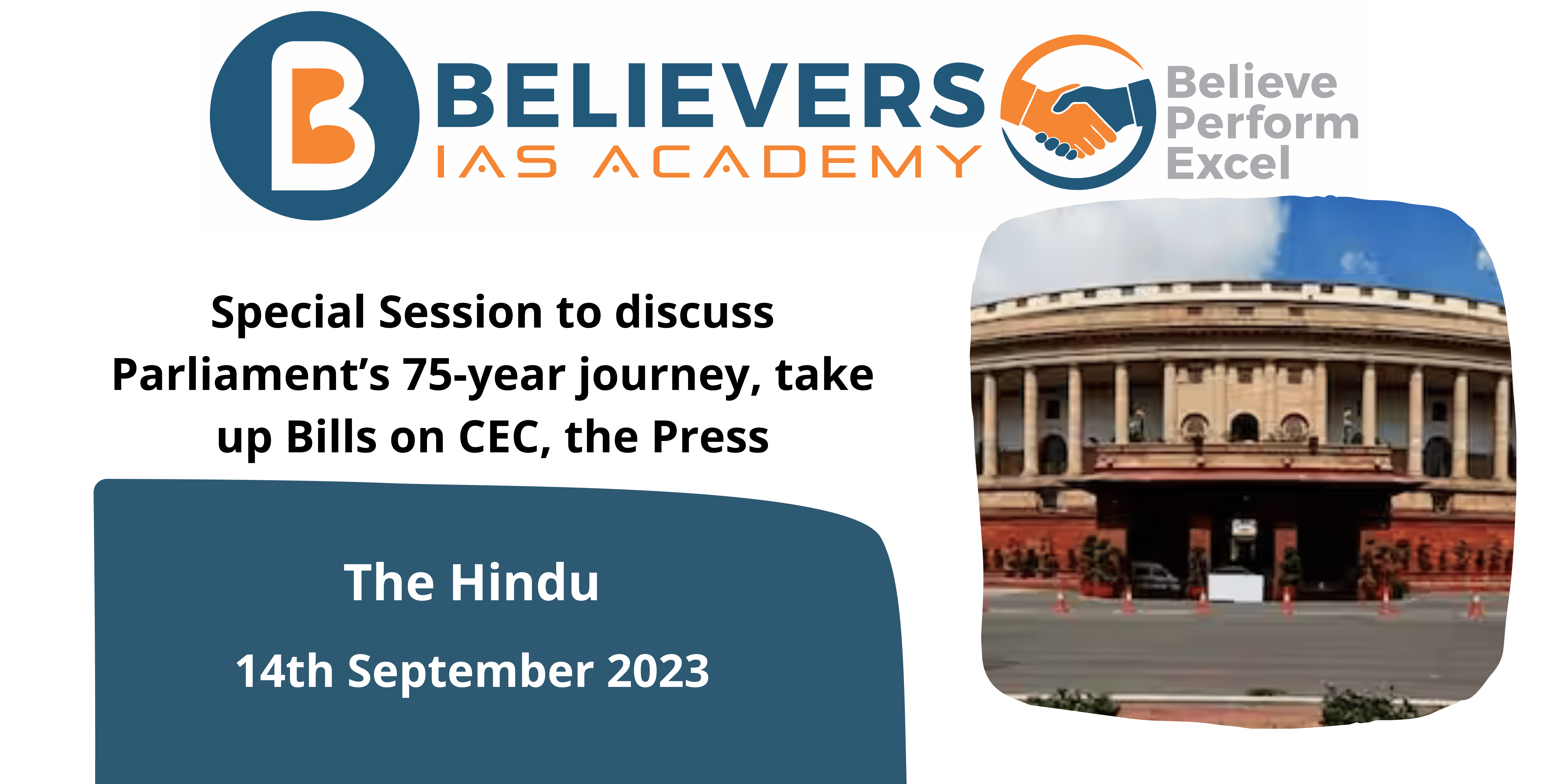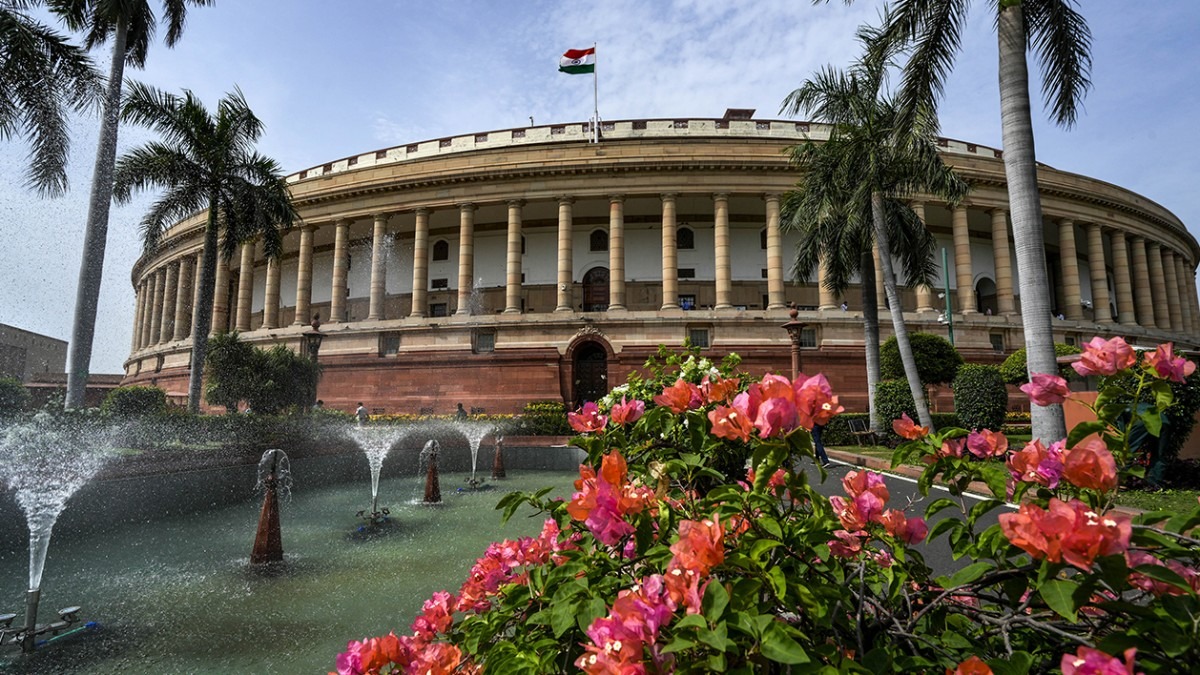Special Session to discuss Parliament’s 75-year journey, take up Bills on CEC, the Press
Context
The two Houses will start talking about Parliament’s 75-year history on the opening day of the Special Session of Parliament, which will take place from September 18 to September 22.
What is the historical background of the Parliament?
- Ancient Period:
-
-
- “Sabhas” or “Samitis”—assemblies or councils—were common in ancient India. These were conferences of learned academics and political figures who discussed a range of topics, including social, legal, and governmental difficulties.
- Maurya Empire:
- Emperor Ashoka is credited with calling the first known Buddhist council during the Maurya Empire (c. 322-185 BCE), which can be viewed as an early example of a deliberative group.
-
- Gupta Period:
-
-
- Decision-making took place in gatherings known as “Mahasabhas” and “Mahapanchayats” throughout the Gupta period (c. 320-550 CE).
-
- Medieval Period:
-
-
- Various medieval kings, including the Cholas and Mughals, had their own councils or assemblies to provide guidance and support for reign.
-
- British Colonial Rule:
-
-
- The British colonial era is largely responsible for India’s current configuration of parliamentary democracy. To accommodate some Indian representation, the British established a legislative council in 1858. This body then changed its name to the Imperial Legislative Council in 1861.
-
- Government of India Act, 1935:
-
-
- A federal government and a bicameral legislature were established at the national level according to the Government of India Act, of 1935. It called for the creation of both a Council of States (Council of State) and a Federal Assembly (Central Legislative Assembly).
-
- Indian Constitution:
-
-
- India became independent in 1947, and on January 26, 1950, it enacted its own Constitution. The Lok Sabha (House of the People) and Rajya Sabha (Council of States) are the two houses of the Indian Parliament, which is created by the country’s constitution.
-
- First General Elections:
-
-
- In 1951–1952, India held its first general elections, ushering in a parliamentary system that was entirely democratic and representative. Jawaharlal Nehru was chosen as India’s first Prime Minister, while Dr. Rajendra Prasad was chosen as the country’s first President.
-
- Evolution and Growth:
-
-
- The Indian Parliament has changed and become more significant over time. It is essential to the legislative process, governmental supervision, and representation of the different interests of the Indian populace.
-
- Today’s role of the Indian Parliament:
-
- The Indian Parliament is a dynamic institution with a multi-party system, a complex legislative procedure, and engaging debates. It is an essential part of India’s democratic system, in which the Prime Minister serves as the head of government and the President serves as the ceremonial head.
What are the agendas of the special session in the parliament?
-
- Discussion on Parliment’s 75-year Journey: The Special Session will begin with a discussion on the “Parliamentary journey of 75 years starting from Samvidhan Sabha — achievements, experiences, memories, and learnings.” The history and accomplishments of the Indian Parliament since its founding are probably being discussed here.
- Moving to the New Parliament Building: According to the agenda, a move to the new Parliament building is planned. Even though the new structure was officially opened on May 28, no formal justification was given for why it was not utilized during the Monsoon Session. This could come up during the session.
- Bills to be discussed: A draft list of the bills that will be addressed during the special session of Parliament from September 18 to September 22 has been made public by the Indian government. The list consists of:
-
-
- The Advocates (Modification) Bill, 2023
- The Press and Registration of Periodicals Bill, 2023
- The Chief Election Commissioner and other Election Commissioners (Appointment Conditions of Service and Term of Office) Bill
-
What is The Advocates (Modification) Bill, 2023?
- On August 1, 2023, the Advocates (Amendment) Bill, 2023, was presented in the Rajya Sabha. The Advocates Act of 1961 was amended by the bill. The legislation intends to codify legal regulation into a single act. Additionally, it aims to reach “touts”.
- The Legal Practitioners Act of 1879 was repealed in part by this measure. The 1961 Act unifies the legislation governing attorneys. The bill suggests that the legal profession be governed only by the Advocates Act of 1961.
- Federal Justice Minister Arjun Ram Megwal introduced the bill. It’s a part of the government’s efforts to repeal antiquated laws from before independence.
What is The Press and Registration of Periodicals Bill, 2023?
- The Rajya Sabha approved the Press and Registration of Magazines (PRP) Bill, 2023 to streamline the registration procedure for magazines. The PRB Act, of 1867, from the British era is replaced by the bill. The legislation tries to strike a balance between regulation and publisher relief.
- The measure stipulates that if a magazine is published without a registration certificate, a maximum of six months in prison may be imposed. The measure also permits the PRG to fine publishers of magazines without registration up to 5 lakh.
- The “draconian provisions” in the law caused worry from the Editors Guild of India.
Conclusion
The evolution of the Indian Parliament over time illustrates the nation’s transition from ancient assemblies to contemporary democratic institutions, signifying India’s dedication to democracy and representative government.





